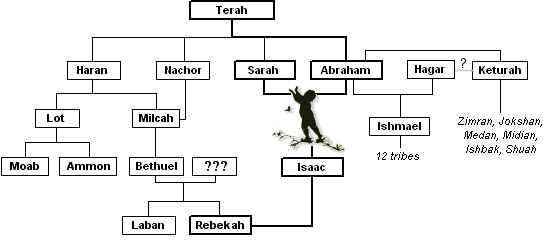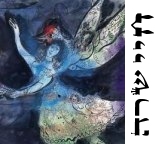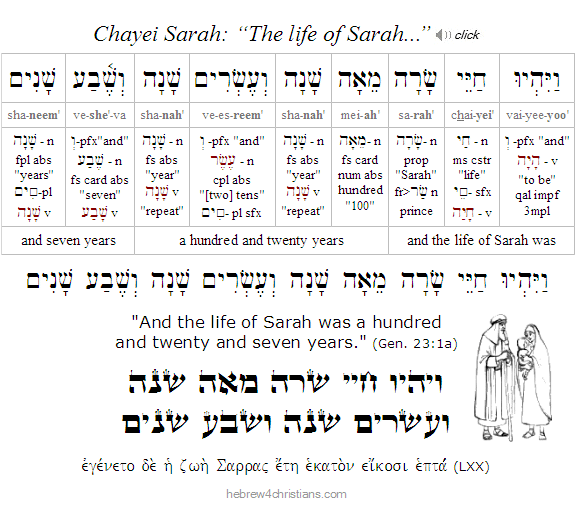|
Abraham had encamped at various times at the trees of Mamre, just east of Hebron, and this is the place where Sarah, the mother of the Jewish people, died at the age of 127 (some of the Jewish sages have said that the shock of the Akedah - the near sacrifice of Isaac - is what killed her). After mourning for Sarah, Abraham spoke to the sons of Heth (bnei Chet) saying that he was ger v'toshav (a stranger and a sojourner) among them, and asked to bury his wife in the nearby Cave of Machpelah (thought by the sages to be the resting place of Adam and Eve). Abraham inquired about the price for the cave and field, and without any negotiation, paid Ephron the Hittite's asking price of 400 shekels of silver - an exorbitant price - in the full presence the leaders of the Hittites. He then buried Sarah in the cave among the people of the Hittites. (Abraham's insistence upon separate Jewish burial site is part of Jewish law to this day; reflecting the Jew's role in life and society- "a stranger and a sojourner"- here, yet not here.)
After this, Abraham's servant, Eliezer of Damascus (the one Abraham had originally thought would be his heir), made a covenant with Abraham to find his son Isaac a wife from among his relatives living in Mesopotamia - and not from among the Canaanites. Eliezer took the oath and set out on the 550 mile journey to Haran (also called the city of Nahor and the place where his father Terah died), taking ten camels laden with gifts in search of Isaac's bride.
At a village well near the City of Nahor, Eliezer made the camels kneel down and asked the LORD for a sign: when the maidens would come to the well, he would ask some for water to drink, but the woman who offered to also draw water for his camels as well would be the one chosen by the LORD for Abraham's son.
As if scripted by hashgachah (divine providence), before he had finished praying, Rivkah (Rebekah), Abraham's nephew's daughter, came out with her water jar on her shoulder. Eliezer ran to her and asked her for a drink, and after giving him some water, generously offered to draw water for all ten of his camels. After she "passed the test," Eliezer gave her expensive rings and bracelets and inquired of her family status. When he learned that the LORD had led him directly to Abraham's close kinsmen (Rebekah was the granddaughter of Abraham's brother Nachor), he was overjoyed and thanked the LORD for guidance and success.
Meanwhile Rebekah ran home to tell her family what happened and her brother Lavan (Laban) went out to invite Eliezer to come under their hospitality. Eliezer agreed but refused to eat with them until he had clearly communicated the purpose of his mission and fulfilled his promise to his master Abraham.
Eliezer then retold the entire story of his journey from Abraham in Canaan, including his prayer to the LORD for the sign of a wife for Abraham's son, and how Rebekah had passed the divine test. He then asked Rebekah's family whether they would show kindness to their relative Abraham by agreeing to give Rebekah as Isaac's wife, so that Eliezer would know whether to "turn to the right hand or to the left."
Both Bethuel and Laban agreed that the LORD had indeed chosen Rebekah to be Abraham's son's wife and did not object to the match. Upon hearing this, Eliezer gave Rebekah more gifts and also gave gifts to the rest of the family. They then ate a meal together and spent the night.
The following morning, Eliezer wanted to leave for Canaan with Rebekah, but her parents wanted her to stay another ten days. When they finally asked her if she was willing to depart immediately, she said she was, and left for Canaan without further delay with her maidservants. Eliezer then led Rebekah back to the land of Canaan, where she met and married Isaac. Isaac loved her and was comforted over the loss of his mother Sarah.
We are then told that, after the death of Sarah, Abraham got remarried to a woman named Keturah (some claim that she was actually Hagar) who bore him six more sons. Abraham later gave gifts to these children as a legacy, but left everything else he owned to Isaac, the appointed (and exclusive) heir of the family.
The parashah ends with Abraham's death (at age 175), and how his two sons (Isaac and Ishmael) buried him in the Cave of Machpelah beside his wife Sarah. As a postscript, we are also told of the descendants of Ishmael and of his death (at age 137):
 |
|




